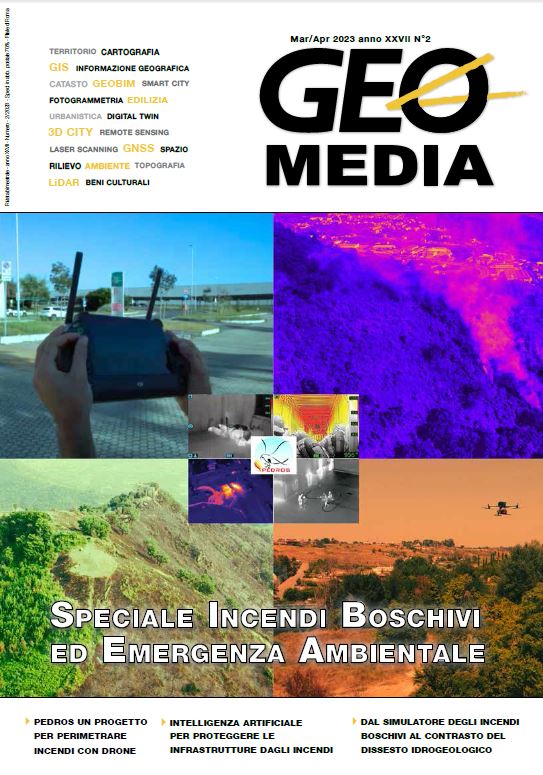Il progetto AI-RON MAN
come l’unione di dati satellitari ed Intelligenza Artificiale ci aiuterà a proteggere le infrastrutture dagli incendi
Parole chiave:
artificial intelligence, earth observation, risk, wildfire, critical infrastructureAbstract
Climate change has significantly increased forest
fire risk across EU, threatening our critical
infrastructures providing essential for services,
e.g. mobile telecommunication. AI-RON MAN
project aims to deliver a tool to dynamically predict
wildfire risk in areas where such infrastructures
are located, supporting first responders to
preventively intervene and avoiding service disruption.
The tool will be based on AI techniques
that enable the exploitation of existing historical
datasets (including satellite images from Copernicus)
to forecast future wildfire likelihood and
expected severity.
Riferimenti bibliografici
European Environment Agency, «EEA,» November 18th 2021. [Online]. Available: https://www.eea.europa.eu/ims/forest-fires-ineurope#
footnote-JQYK6UAN.
Gomes Da Costa Hugo; De Rigo Daniele; Libertà Giorgio; Durrant Tracy; San-Miguel-Ayanz Jesus, «European wildfire danger and vulnerability
in a changing climate: towards integrating risk dimensions» 2020. Available: https://www.adaptecca.es/sites/default/files/documentos/pesetaiv_
task_9_forest_fires_final_report.pdf.
«Forest Fires in Europe, Middle East and North Africa 2019,» 2020. Available: https://effis-gwiscms.s3-eu-west-1.amazonaws.com/effis/reportsand-
publications/annual-fire-reports/2019_Fire_Report_HighRes_final_PTcorrection/Annual_Report_2019_final_topdf_2.pdf.
S. Anderson, C. Barford e P. Barford, «Five Alarms: Assessing the Vulnerability of US Cellular Communication Infrastructure to Wildfires,»
IMC '20: Proceedings of the ACM Internet Measurement Conference, 2020.
S. M. Jesús García Fernández, “Broad-UNet: Multi-scale feature learning for nowcasting tasks,” Neural Networks, 2021.
Ernest & Young, «The economic contribution of the European tower sector,» 2020.
AI4Copernicus project website, https://ai4copernicus-project.eu/
Pictet, Il machine learning può predire il futuro del pianeta (2021), https://am.pictet/it/blog/articoli/tecnologia-e-innovazione/il-machinelearning-
puo-predire-il-futuro-del-pianeta
ClimateAI website, https://climate.ai/
ANSA, Con l’IA, prevedere gli eventi climatici estremi è più facile (2022), https://www.ansa.it/osservatorio_intelligenza_artificiale/
notizie/societa/2022/03/25/con-lia-prevedere-gli-eventi-climatici-estremi-e-piu-facile_fed93b22-7f10-487f-a1d6-a397adbf5a7c.html
Sandonnini P., ChatGPT, impariamo tutto sulla grande novità di OpenAI (2023), https://www.ai4business.it/intelligenza-artificiale/chatgptopenai/
Climate Data Storage website, cds.climate.copernicus.eu
Dowloads
Pubblicato
Fascicolo
Sezione
Licenza

Questo volume è pubblicato con la licenza Creative Commons Attribuzione - Non commerciale - Condividi allo stesso modo 4.0 Internazionale.
Gli autori che pubblicano su questa rivista accettano le seguenti condizioni:- Gli autori mantengono i diritti sulla loro opera e cedono alla rivista il diritto di prima pubblicazione dell'opera, contemporaneamente licenziata sotto una Licenza Creative Commons - Attribuzione che permette ad altri di condividere l'opera indicando la paternità intellettuale e la prima pubblicazione su questa rivista.
- Gli autori possono aderire ad altri accordi di licenza non esclusiva per la distribuzione della versione dell'opera pubblicata (es. depositarla in un archivio istituzionale o pubblicarla in una monografia), a patto di indicare che la prima pubblicazione è avvenuta su questa rivista.
- Gli autori possono diffondere la loro opera online (es. in repository istituzionali o nel loro sito web) prima e durante il processo di submission, poiché può portare a scambi produttivi e aumentare le citazioni dell'opera pubblicata (Vedi The Effect of Open Access).





